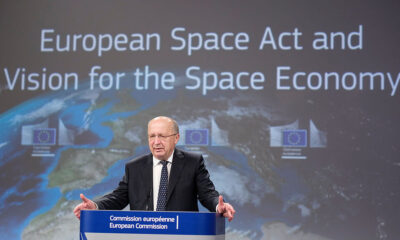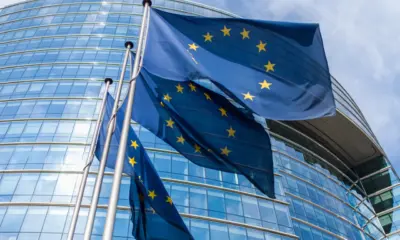Technology
EU Launches €2 Trillion Budget Plan Amid Divisions Among Member States

The European Union is set to engage in contentious negotiations over its proposed €2 trillion budget for the period from 2028 to 2034. On Friday, EU member states gathered to discuss the spending plans, revealing significant divisions among the 27 capitals. The budget, referred to as the “budget bazooka,” aims to support the bloc’s economy, enhance defense capabilities, and provide assistance to farmers, all while addressing existing debts.
The upcoming negotiations between the European Parliament and member states are expected to be challenging. Member states, which primarily fund the budget through taxes and customs duties, are resistant to increasing their financial contributions. “In a time where national budgets are under great economic pressure, the answer can’t be more money and a bigger budget,” stated Jessica Rosencrantz, Sweden’s EU Minister.
Key Spending Proposals and Priorities
A central focus of the budget is to bolster the EU’s competitiveness in the global market, particularly against US and Chinese businesses. Mario Draghi, author of a critical report on EU investment needs, emphasized that the bloc requires annual investments of at least €750-800 billion for meaningful change. In response, Ursula Von der Leyen, the European Commission President, has proposed a €451 billion competitiveness fund. This fund will prioritize the clean and digital transition, healthcare, defense, and space initiatives.
Additionally, the budget includes plans for a fund of up to €100 billion dedicated to Ukraine’s reconstruction efforts. This is a response to the ongoing conflict and the need for substantial rebuilding in the region.
The proposed budget also addresses agricultural support, with at least €300 billion earmarked for farmers. However, some of this funding may be redirected to other priorities, raising concerns among agricultural stakeholders. France, which benefits significantly from the EU’s Common Agricultural Policy (CAP), has criticized the commission, accusing it of “turning its back” on agriculture. Despite these concerns, the commission has assured that the CAP will retain its own set of rules and financial resources, particularly for direct aid to farmers.
Environmental Commitments and Rule of Law Conditions
Despite fears that the budget might overlook environmental considerations, the European Commission has committed to directing 35 percent of the overall budget—approximately €650 billion—towards climate goals. This commitment comes in light of severe weather events linked to climate change affecting various parts of Europe. While some environmental organizations have criticized this target as insufficiently specific, the World Wildlife Fund has warned that merging key environmental programs into the larger competitiveness fund could jeopardize vital climate initiatives.
In a significant shift, the EU plans to link future funding more closely to the adherence to democratic values. Piotr Serafin, the EU budget chief, stated, “No EU money without the respect of rule of law.” This has sparked discontent in Hungary, where the government has faced scrutiny for rule-of-law violations. Janos Boka, Hungary’s EU minister, dismissed the proposal as a tool for political pressure, labeling it a “non-starter” for Budapest.
The EU’s budget considerations extend beyond its borders, proposing a fund exceeding €200 billion for international investments and aid. This initiative has been welcomed by humanitarian organizations, especially in light of reduced US foreign assistance under previous administrations. The funding aims to strengthen partnerships with countries in the Middle East and North Africa, although critics argue it risks supporting authoritarian regimes with poor human rights records.
As discussions on the EU’s budget unfold, the coming months will be crucial in determining how the bloc balances its diverse priorities and navigates the challenges posed by member states’ differing interests.
-

 Technology4 months ago
Technology4 months agoDiscover the Top 10 Calorie Counting Apps of 2025
-

 Health2 months ago
Health2 months agoBella Hadid Shares Health Update After Treatment for Lyme Disease
-

 Health3 months ago
Health3 months agoErin Bates Shares Recovery Update Following Sepsis Complications
-

 Technology3 weeks ago
Technology3 weeks agoDiscover 2025’s Top GPUs for Exceptional 4K Gaming Performance
-

 Technology2 months ago
Technology2 months agoElectric Moto Influencer Surronster Arrested in Tijuana
-

 Technology4 months ago
Technology4 months agoDiscover How to Reverse Image Search Using ChatGPT Effortlessly
-

 Technology4 months ago
Technology4 months agoMeta Initiates $60B AI Data Center Expansion, Starting in Ohio
-

 Technology4 months ago
Technology4 months agoRecovering a Suspended TikTok Account: A Step-by-Step Guide
-

 Health4 months ago
Health4 months agoTested: Rab Firewall Mountain Jacket Survives Harsh Conditions
-

 Lifestyle4 months ago
Lifestyle4 months agoBelton Family Reunites After Daughter Survives Hill Country Floods
-

 Technology3 months ago
Technology3 months agoUncovering the Top Five Most Challenging Motorcycles to Ride
-

 Technology4 weeks ago
Technology4 weeks agoDiscover the Best Wireless Earbuds for Every Lifestyle





















